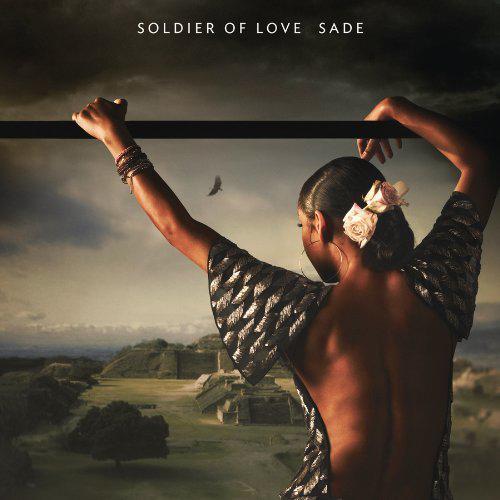
News
Pro-Palestine Encampment Represents First Major Test for Harvard President Alan Garber

News
Israeli PM Benjamin Netanyahu Condemns Antisemitism at U.S. Colleges Amid Encampment at Harvard

News
‘A Joke’: Nikole Hannah-Jones Says Harvard Should Spend More on Legacy of Slavery Initiative

News
Massachusetts ACLU Demands Harvard Reinstate PSC in Letter

News
LIVE UPDATES: Pro-Palestine Protesters Begin Encampment in Harvard Yard
Sade
"Soldier of Love" (Sony) -- 2 STARS

“I’ve lost the use of my heart / But I’m still alive,” sings Sade Adu on the titular track from “Soldier of Love,” Sade’s first album since 2000. For an impressively constructed album based on and made for “love,” this line seems more of a curious apology from the band than a testament to love from a wayward lover.
Impressively, Sade have managed to generate ten new song titles, which is seven more than there are distinguishable songs on the album. Most tracks on “Soldier of Love” hit the same low-tempo, somniferous groove that repeats until it stops, briefly, as if for convention’s sake, and then resumes in another key. The rhythm section, the core of any decent R&B group, sounds too often like the drum and bass GarageBand loops characterized by seamless, emotionally-bereft rhythmic accuracy and a robotic inability to feel—it’s hard to imagine human beings creating this record. This is particularly problematic seeing as “Soldier of Love” eschews pure electronica and trip-hop for more traditional instrumentation—guitar, piano, drums and bass are at the heart of the record—which would intuitively present a more natural and human presence. This lack of feeling is not helped by the fact that Sade write obvious, vacuous shells of songs and then attempt to save them through intricate production which, while impressive, only serves to increase the emotional divide between the band and the listener.
Despite this, however, the production is the album’s most interesting element, creating rich arrangements that almost prevent the songs from becoming overly repetitive. The title track is the most impressive production feat: instruments cut in and out with a staccato aggression and Adu’s overdubbed voice hits multiple registers, weaving a tapestry of interlocking vocal snippets that drive the song’s dynamics from the arid determination of the opening to the rising chorus of wandering lovers. Distorted guitars and synthesizers howl like frigid winds through the track, slicing Adu’s distant vocals and keeping the song from becoming repetitive.
Adu has a uniquely withdrawn yet powerful vocal style. Unfortunately, many of the songs are so mindlessly bland that it is easy to mistake her tasteful emoting for unfeeling coldness. “Morning Bird” is one of the few tracks which highlights and supports her unique vocals. The song traces a staggering piano figure down the sinewy and reserved melodic fragments that Adu shakes down with melancholic elegance. Here, her lack of obvious emoting benefits the song and her voice sounds more powerful than on most. The percussion is minimal—a tambourine shivering over the steady heartbeat of a kick drum. However, on most of the album’s tracks, particularly “Long Hard Road,” and “Bring Me Home,” the production isn’t enough to compensate for the weak songwriting and over-processed instruments, and the listener is left with an unoriginal track that feels vacuous and forced. Adu’s nuanced vocal performance seems, in the context of these songs, emotionless and bored.
“Be That Easy”— which ironically may be the best song on “Soldier of Love”—reveals the album’s deepest flaw. Despite an improvement in dynamic songwriting, the overly processed instruments and production which, in context of the stronger songwriting, is overbearing, keep the song from reaching the emotional peaks for which it aspires. A smoky upright bass pattern lightly supports the Sunday-afternoon strumming of the laconic acoustic and the waves of organ that sweep through the wide-open spaces of the song like wind in fields of grain. Adu pulls off some memorable melodies, making use of her powerful and malleable voice, but the track somehow feels distant and merely pleasant. The instruments still sound prepackaged and the chord changes, while effective, remain obvious. The production, though nearly flawless, places more of an emotional divide between the band and the listener than there should be on what could have been such a relatable song.
The unoriginality of the songwriting is not enough to fully account for the shortcomings of “Soldier of Love.” The album is an impressive study in subtle vocal performances and multi-layered production. However, Sade’s most heinous shortcoming is their surgical extraction of almost all the soul from music that, if nothing else, should be powered by emotion, no matter how trite. On “Babyfather,” Adu sings, “So love, they say, makes you feel this way.” In the cold context of the album, the line sounds uncertain and second-hand. It seems as if Sade is attempting to hedge their bets with unfeelingly vague definitions of love and safely dulled versions of love songs, but, even in a digital age, these mechanically executed tracks don’t quite cut it.
—Staff writer Benjamin Naddaff-Hafrey can be reached at bhafrey@college.harvard.edu.
Want to keep up with breaking news? Subscribe to our email newsletter.
